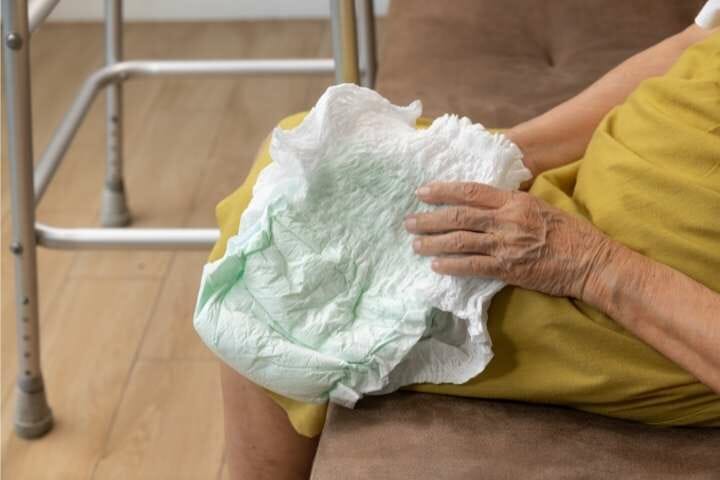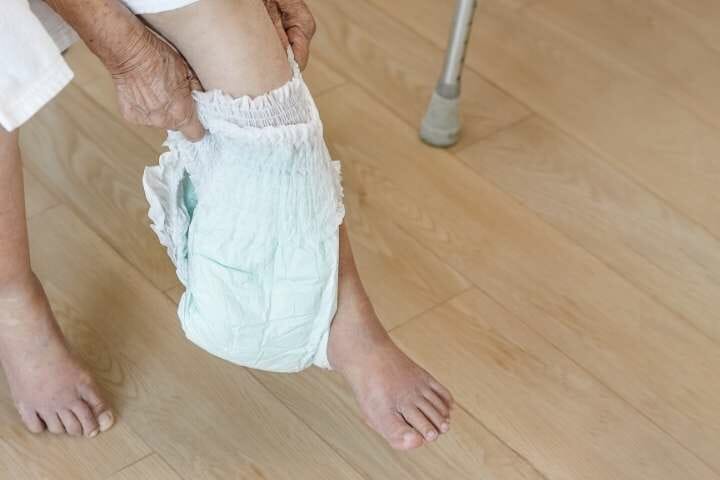Incontinence is a very common issue with the elderly, and many seniors will use adult diapers at some time in their life.

Unfortunately, these supplies can become very expensive especially for seniors who may be living on a fixed income to begin with. So if you receive Medicare benefits, you may be wondering if these benefits cove adult diapers and incontinence supplies.
Here’s what you need to know.
Medicare And Adult Diapers
In short, Medicare does not generally cover the expense for adult diapers. The exception would be for those who are in a nursing home or other type of long-term care facility.
Additionally, plans like Medicare Supplemental Insurance, or Medigap, also doesn’t cover the cost for these supplies.
So for disposable, absorbent products that seniors may need the cost of purchasing those items will be entirely on the individual (or family) who needs them.
You might like to read: Best Diapers For Bedridden Patients
Incontinence Supplies And Medicare
The coverage available to people who need incontinence supplies on Medicare is very limited, and can sometimes be hard to get. Depending on what your finances look like and the type of medical insurance you may have, the costs of these supplies may be reimbursed to you or they could be an income tax write off.
There are a few options and insurance plans available to you.
Medicare Advantage
It has been noted that Medicare does not provide coverage for incontinence supplies, but in many states the Medicare Advantage plans are offered by private companies like Blue Shield or United Healthcare. These private companies will usually offer coverage for these supplies.
So as a general rule, Medicare itself does not offer coverage for these types of supplies but if you live in a state where the Advantage plan is offered by one of these private companies then you may be able to get that kind of coverage.
In order to get the coverage, you will need to make sure you are purchasing all supplies needed from an eligible provider. This means that the company has been approved to handle claims and, often times, will process the claim directly for you.
You might like to read: How to Convince an Elderly Parent to Wear a Diaper
In many cases, there are limits per month as to exactly how much each person can buy in supplies. The limits to each plan will vary, but in general people are usually covered for purchasing up to 300 diapers or disposable briefs per month.
Further, if you require other incontinence supplies then the coverage for these kinds of supplies may vary by plan as well as some insurance companies will divide up incontinence supplies into different categories for coverage.
For example, you may only be covered for bed under pads if you also need diapers or briefs. For exact coverage with the Medicare Advantage plans, you will need to look up who your provider is in the state you live and determine what the type of coverage they offer is.

Medicaid
If you have qualified for Medicaid in the state you live in, then there may be some type of coverage available for your incontinence supplies. Every state will decide on their own exactly what types of incontinence supplies to cover, so it’s hard to say that all Medicaid recipients will get coverage for it.
The good news is that most, but not all, states offer some coverage for incontinence supplies. The bad news is that the amount of coverage really differs from state to state.
The majority of states will offer coverage and benefits for people on Medicaid to purchase disposable briefs or adult diapers, bed under pads and even bladder control pads. In some states, they even get coverage for gloves and wipes.
Unfortunately, there have been some recent cuts in an effort to help control costs by many states. In order to do this, they have lowered the amount that is eligible for reimbursement for incontinence supplies, or they have lowered the amount in supplies that a person on Medicaid can receive.
In order to get these benefits in each state, your doctor will need to write you a prescription for a medical condition where you need these incontinence supplies. In most cases, the doctor will write the prescription so that it specifies how much you require in supplies on a monthly basis so that Medicaid is made aware of exactly what your needs are.
You might like to read: Bedpan Alternatives for Managing Urinal Incontinence
The state you live in will dictate how you receive your supplies, too. The two main options that most states use are through an approved supplier who submits the claim on your behalf to the state or via a managed care plan that will include giving you these products as part of their services (like an in home care service).
If you have questions about what your particular state Medicaid program covers, you will need to contact your state’s Medicaid office to ask exactly what is offered for you in your state.
Veterans’ Administration
If you received benefits from the VA as a veteran, then you are eligible for help with incontinence supplies.
The Pharmacy Services associated with Veterans’ Administration will provide them to people receiving these benefits on a monthly (or other recurring) basis, and usually as part of the home care prescribed for the person receiving the benefits.
If the brand given to you doesn’t meet your needs (for example, doesn’t have the absorbency you need) then you can ask for another brand or type of product. You may need to contact your doctor to get a new prescription written to meet the needs you have now, and change the products you’re receiving.
You may have to do some research online as to which brand may be the best one for you so you know which one to ask your doctor for. The new prescription or note from your doctor will need to include the reasons why you need this specific brand or why you’re looking for a new product.
You might like to read: How to Report Elderly Financial Abuse?
Health Savings Accounts
If you don’t qualify for Medicaid due to income or assets, and you are not yet 65 years old then you may be able to use the cost of incontinence supplies as a deductible expense out of your health savings account.

These accounts are usually part of a high-deductible health plan and can be used to pay for what are qualified medical expenses, as classified by the IRS.
If the incontinence you experience is caused by a diagnosed medical condition then these supplies will very likely be covered.
Any contributions you make to a health savings account are not going to be subject to federal income tax and the funds will accumulate year over year if you don’t use them.
If you have one of these accounts make sure you keep all receipts for purchases made as you will need to submit them to the plan administrator to get reimbursed.
If a health savings account doesn’t sound like a good option for you then you may want to consider a flexible spending account. An FSA must be set up by an employer so this would only be an option if you are still working, at least part-time.
You will designate an amount from each paycheck that will be put into the account. The money put in here is not subject to federal or state taxes and you can withdraw the funds at any time to help pay for qualified medical expenses.
What is deemed a qualified medical expense may be different from employer to employer, depending on if it’s backed by an insurance company or funded entirely by the employer. They will be able to provide you with a list of what’s covered but generally speaking, incontinence supplies will often be covered.
You might like to read: What Is Money Follows the Person Program
Can I Get Any Free Incontinence Products?
If you are looking for sample products because you are not sure as to what exactly you want to use or how they will work for you, there are some ways to get free samples to try first.
With your concerns, talk to your doctor first to let them know what you are experiencing and they will be able to help recommend products that will work for what you need.
From there, they may know of companies that are giving out free samples to help you out until you can get benefits in place.
Sometimes companies will give out 30 day samples so that you have enough to get you through, and see if their products will work for you.
In Closing
Needing to use incontinence products can be embarrassing and something that you don’t want to talk about. Asking the doctor for help may not be easy but it is the first step to getting the supplies you need covered.
There are options to get incontinence products covered by insurance, but you do need to know where to start and how to apply for benefits. Your doctor does need to document that you have a medical condition causing the incontinence and so the supplies needed are as a direct result of that condition.
If you have questions specifically about insurance, give your Medicare or Medicaid office a call to ask about the benefits you qualify for and how to get coverage or reimbursed for supplies.
